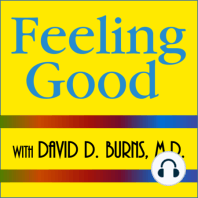50 min listen

Corona Cast 4: I Might Lose My Husband!
Corona Cast 4: I Might Lose My Husband!
ratings:
Length:
97 minutes
Released:
Apr 9, 2020
Format:
Podcast episode
Description
David and Rhonda are joined in today’s podcast by Dr. Taylor Chesney, a former student of David’s who is now the head of the Feeling Good Institute of New York City. She is a prominent TEAM-CBT therapist and trainer, and specializes in the treatment of children and teenagers. Taylor kindly agreed to do some live work today on her panic and despair because of the impact of the pandemic on her family. Her situation is especially challenging and poignant because her husband, Gregg, is a highly esteemed Emergency Room / Intensive Care physician in New York, and he is constantly working to save the lives of Covid-19 victims. Ten days ago he moved to a separate apartment several blocks away so he will not put his wife and children in harm’s way in case he contracts the Covid-19 virus. But will he, himself, be struck down by this vicious virus? He told Taylor that he recently had to intubate several of his colleagues, which is horrifying. Taylor fears that she may lose her beloved husband, and that her three children may have to grow up without a father. She also feels overwhelmed because she’s supporting many people now. David begins with a brief overview of the cognitive model, including several key points: All negative feelings result from thoughts, and not from what’s actually happening. So even in a crisis that is as real and devastating as the Covid-19 pandemic, all of our emotions will still result from the way we think about it. Remember the teachings of Epictetus 2,000 years ago, when he wrote: “People are disturbed, not by things, but by the views we take of them.” This is potentially empowering, because we usually cannot change the fact—the pandemic is real and we are powerless to make it disappear—but we may be able to change our perceptions (eg thoughts, or “cognitions”) about what’s happening. There’s a healthy and an unhealthy version of every kind of negative feeling. For example, healthy fear is not the same as unhealthy anxiety; healthy sadness and grief are not the same as clinical depression; healthy remorse is not the same as neurotic guilt. And so forth. Our goal is not teaching you how to be happy all the time no matter what—that would be absurd—but simply to reduce or eliminate unhealthy negative feelings. Healthy negative feelings result from valid negative thoughts, and do not have to be “treated.” Unhealthy negative feelings, in contrast, result from negative thoughts that are distorted and illogical. David reminds us that even in a crisis, depression and anxiety are still the world’s oldest cons, and that you CAN change the way you feel. But is this possible? It just doesn’t sound right! Can Taylor really change the way she thinks and feels when the crisis is so overwhelming and so real? And can you? As the session unfolds, Taylor tearfully describes her intense fears for her husband, who she loves so greatly, as well as their three young children. She says that 75% of the time, she’s “okay,” when she’s awake and involved with caring for her kids, but 25% of the time—especially late at night when she’s alone with the kids—things get pretty desperate, and sobs for 30 minutes or more while experiencing “sheer terror.” What’s making the situation more painful is that Gregg is temporarily living six blocks away in order to protect his family in the event he does contract the potentially deadly virus. Taylor says that “it feels like we’re kicking him out. He’s at war. He’s fighting, struggling, suffering.” She says he’s passionate about his work, but she wishes he’d quit! Take a look at Taylor's Daily Mood Log at the start of the session. As you can see, she is focusing on how she is feeling every night before going to sleep. She circled seven different categories of negative feelings, and all are intense, including the depression, anxiety and frustration clusters (all are 100%), the lonely and hopeless categories (both 90%), as well as feeling “bad” (50%.) You can also see the negative thoughts she reco
Released:
Apr 9, 2020
Format:
Podcast episode